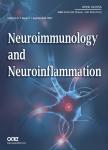Cerebral ischemia at early postoperative period of direct revascularization for moyamoya disease: a case report and literature review
Cerebral ischemia at early postoperative period of direct revascularization for moyamoya disease: a case report and literature review作者机构:Department of NeurosurgeryBeijing Tiantan HospitalCapital Medical UniversityBeijing100050China China National Clinical Research Center for Neurological DiseasesBeijing100050China Department of NeurosurgeryPeking University International HospitalPeking University Health Science CenterBeijing102206China Center of StrokeBeijing Institute for Brain DisordersBeijing100050China Beijing Key Laboratory of Translational Medicine for Cerebrovascular DiseaseBeijing100050China
出 版 物:《Neuroimmunology and Neuroinflammation》 (神经免疫与神经炎症(英文版))
年 卷 期:2017年第4卷第3期
页 面:46-53页
学科分类:1002[医学-临床医学] 100214[医学-肿瘤学] 10[医学]
基 金:the Ministry of Science and Technology of China,National Key Technology Research and Development Program(2015BAI12B04,2013BAI09B03) Beijing Institute for Brain Disorders grant(BIBD-PXM2013_014226_07_000084) National Natural Science Foundation of China(H090681271313 and H090681571110 to Y.L.Zhao and 81500995 to X.L.Chen) China Scholarship Council(201508110252 to L.Ma)
主 题:Moyamoya disease cerebral revascularization transient neurological events perioperative management
摘 要:Hypoperfusion and hyperperfusion could be causes of early postoperative complications that lead to neurological deterioration in patients with moyamoya diseases (MMD) after superficial temporal artery (STA) and middle cerebral artery (MCA) anastomosis. Here, the authors described a case of child-onset bilateral MMD that manifested transient cerebral ischemia in the contralateral hemisphere after left STA-MCA bypass in young adulthood. A new onset of cerebral ischemia in the contralateral hemisphere and transient neurological deterioration suggested the fragile hemodynamics of MMD during early perioperative period. Serial evaluation of postoperative cerebral hemodynamics and perfusion might facilitate targeted management in patients with unstable or advanced MMD.



